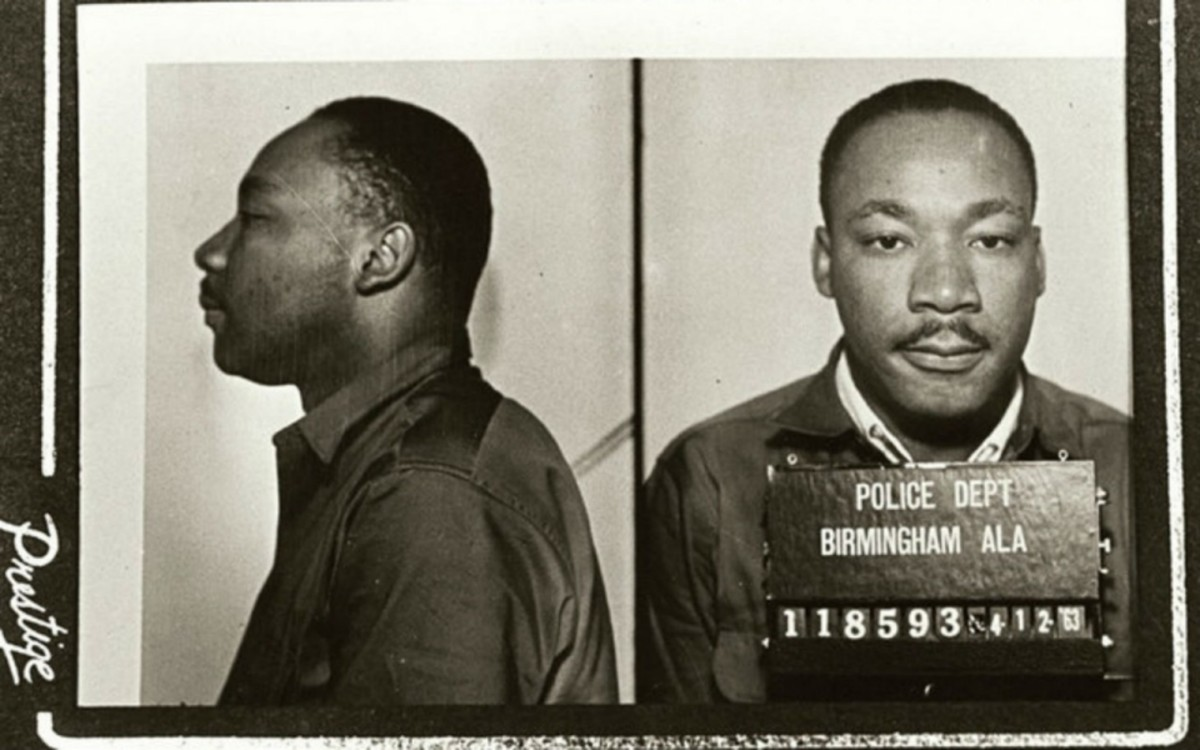On this dayApr 12, 1963
Bull Connor Orders Dr. Martin Luther King Jr. and Dozens More Civil Rights Marchers Violently Arrested in Birmingham
On April 12, 1963, Dr. Martin Luther King Jr. and at least 55 others, almost all of whom were Black, were jailed for “parading without a permit” during a march against segregation in Birmingham, Alabama.
A crowd of over 1,000 activists joined Dr. King, the Rev. Fred Shuttlesworth, and the Rev. Ralph Abernathy on a non-violent march toward the downtown area as hundreds more people lined the streets to support them. The peaceful marchers, embarking from Sixth Avenue Zion Hill Church in a predominantly Black neighborhood and headed for City Hall, met a first police barricade and continued on in a different direction. When the marchers neared a second police barricade, Commissioner Eugene “Bull” Connor gave the officers clear orders: “Stop them… Don’t let them go any further!”
Connor was a notorious segregationist with close ties to the Ku Klux Klan. At his command, several motorcycle patrolmen surrounded the crowd of peaceful marchers and began violent mass arrests. Police officers arrested Dr. King and the Rev. Abernathy first, then continued grabbing and hitting the marchers. At least 54 more people were arrested that day, including the Rev. Shuttlesworth.
The arrested marchers were charged with violating an injunction barring “racial protests” in Birmingham. City officials had obtained the injunction from a circuit judge earlier that same week, after arguing that civil rights protests attracted violence—even though the protests were always explicitly non-violent, and the violence that did occur was regularly wielded by police targeting the demonstrating activists. Throughout activists’ 1963 Birmingham campaign to challenge racial segregation, the entire world witnessed the police’s brutal treatment of nonviolent activists through newspaper photographs and televised footage depicting demonstrators being bitten by dogs, beaten by officers, and slammed into walls by fire hoses.
Dr. King and others were held in the Birmingham Jail for several days after their arrest, while allies worked to raise money for bail. During this time, Dr. King drafted his famous "Letter from a Birmingham Jail" in response to a joint letter several white ministers had published in the local press that decried the march and civil rights activists’ methods.
“For years now I have heard the word ‘Wait!’” Dr. King wrote. “It rings in the ear of every Negro with piercing familiarity. This ‘Wait’ has almost always meant ‘Never.’”
We must come to see, with one of our distinguished jurists, that ‘justice too long delayed is justice denied.’ We have waited for more than 340 years for our constitutional and God given rights. . . . [and] we still creep at horse and buggy pace toward gaining a cup of coffee at a lunch counter.
You deplore the demonstrations taking place in Birmingham. But your statement, I am sorry to say, fails to express a similar concern for the conditions that brought about the demonstrations. I am sure that none of you would want to rest content with the superficial kind of social analysis that deals merely with effects and does not grapple with underlying causes. It is unfortunate that demonstrations are taking place in Birmingham, but it is even more unfortunate that the city's white power structure left the Negro community with no alternative.
Oppressed people cannot remain oppressed forever. The yearning for freedom eventually manifests itself, and that is what has happened to the American Negro. Something within has reminded him of his birthright of freedom, and something without has reminded him that it can be gained. Consciously or unconsciously, he has been caught up by the Zeitgeist, and with his black brothers of Africa and his brown and yellow brothers of Asia, South America and the Caribbean, the United States Negro is moving with a sense of great urgency toward the promised land of racial justice. If one recognizes this vital urge that has engulfed the Negro community, one should readily understand why public demonstrations are taking place.
Dr. King was released on bond on April 20, 1963, but continued his work as a civil rights leader until he was assassinated five years later.
Most white Americans, especially in the South, supported segregation and opposed the civil rights activism that Dr. King and many others waged against it. As civil rights advocates began to win important judicial and legislative victories, white Americans implemented a strategy of massive resistance, deploying a range of tactics and weapons to discourage activism and slow the tide of progress. Some of these methods, such as criminalizing, arresting, and imprisoning peaceful protestors, foreshadowed the modern mass incarceration era. Other methods, such as bombing and murdering civil rights activists, used lethal violence to maintain white supremacy just as white mobs had used lynching throughout the era of racial terror.
Read EJI’s report on Segregation in America to learn more about the massive resistance to civil rights and equality for Black Americans.

About EJI
The Equal Justice Initiative works to end mass incarceration, excessive punishment, and racial inequality.
About this website
Until we confront our history of racial injustice and its legacy, we cannot overcome the racial bias that exists today.
 Learn more
Learn more